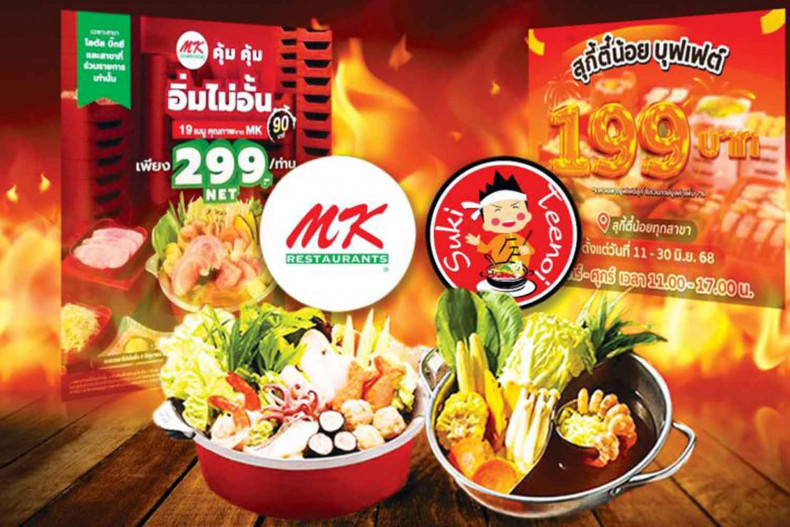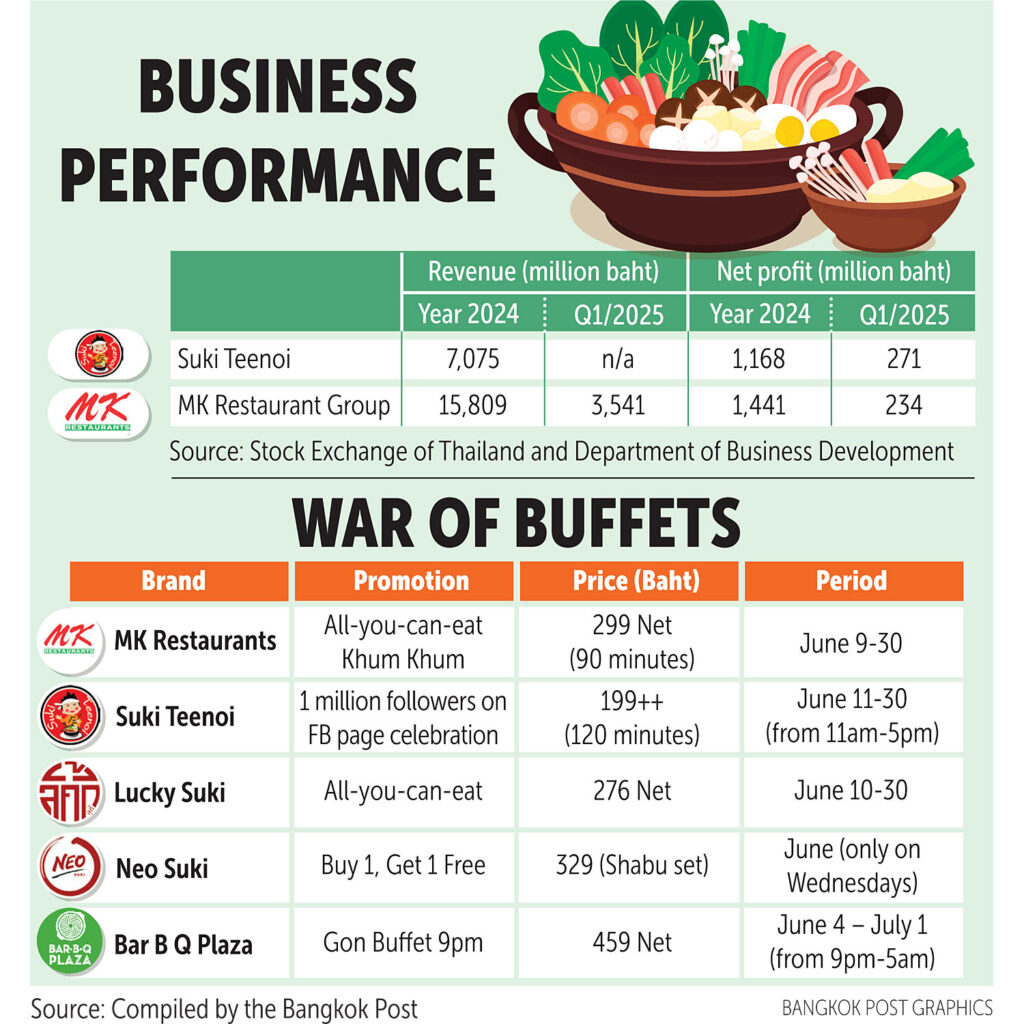Sukiyaki battle boils up

As consumers tighten their budgets, leading sukiyaki restaurants are engaging in a price war to attract customers. This strategy has advantages and drawbacks, while the effect on sales can be uncertain.
Local suki giants MK Restaurants and Suki Teenoi are going head-to-head in a battle for diners, as the sluggish economy affects purchasing power and bites into sales at eateries.
On the opening day of its 299-baht buffet promotion, MK Restaurants was overwhelmed by a flood of customers, which caused a shortage of raw materials.

The company quickly recognised the issue and expressed regret for the inconvenience caused, responding by increasing staff and restocking supplies.
Apart from this temporary promotion, MK Restaurants offers buffet options at select venues, featuring net prices between 499 baht and 899 baht per person for a 90-minute meal.
Suki Teenoi, a popular budget suki buffet restaurant, recently rolled out a promotion to celebrate 1 million followers on its Facebook page. For 199 baht, customers can enjoy all you can eat, excluding drinks and value-added tax (VAT).
Several Suki Teenoi enthusiasts took to social media to note when accounting for drinks and VAT, the total of 254 baht for the promotion is only about 25 baht less than the usual buffet prices.
Seri Wiriyapong, a loyal customer, said the promotion is appealing and could increase sales during the quieter hours from 11am to 5pm on weekdays.
Another consumer, a regular visitor to both brands who requested anonymity, said the quality of ingredients differs, with those of MK being significantly better.
MK also has a wide variety of dishes including roast duck, as well as a better tasting sauce, said the consumer.
However, this special buffet promotion has limited offerings and does not include the brand’s popular items such as roast duck.
“You get what you pay for, as MK’s raw materials are significantly more expensive than those of Suki Teenoi,” said the consumer.
Chanon Koetcharoen, president of the Restaurant Association, said in an economic downturn, diners will find “options they perceive as value for money” on a fixed budget.
Restaurants normally have a marketing campaign during the industry’s low season, which is how he described MK’s gimmick. During the rainy season, diners prefer restaurants situated in department stores over standalone locations, said Mr Chanon.
These pricing campaigns will affect small standalone restaurants during the low season, as customers turn away from standalone eateries and flock to restaurants located in malls, he said.
However, when the promotional campaigns end, the market will return to normal, said Mr Chanon.
The pricing campaigns will also create a perception among customers familiar with certain prices, he said.
For example, if prices are set at 300 baht, Mr Chanon said customers will perceive that level of food should remain at the same price, unless another brand offers something beyond the baseline.
In the future, if an establishment raises its prices, fewer customers are likely unless the new prices offer added benefits, he said.
“In the past, many local restaurants could compete solely on taste. Now, there’s more to the competition than just the taste of the food,” said Mr Chanon.
Several restaurants offer tasty food, as owners have access to a variety of ingredients, including pre-prepared raw materials, sauces and condiments, he said.
Now these eateries must compete on other factors that bring customers back again, including location, service, cleanliness and facilities such as toilets and parking lots, said Mr Chanon.
credit : The company quickly recognised the issue and expressed regret for the inconvenience caused, responding by increasing staff and restocking supplies.
Apart from this temporary promotion, MK Restaurants offers buffet options at select venues, featuring net prices between 499 baht and 899 baht per person for a 90-minute meal.
Suki Teenoi, a popular budget suki buffet restaurant, recently rolled out a promotion to celebrate 1 million followers on its Facebook page. For 199 baht, customers can enjoy all you can eat, excluding drinks and value-added tax (VAT).
Several Suki Teenoi enthusiasts took to social media to note when accounting for drinks and VAT, the total of 254 baht for the promotion is only about 25 baht less than the usual buffet prices.
Seri Wiriyapong, a loyal customer, said the promotion is appealing and could increase sales during the quieter hours from 11am to 5pm on weekdays.
Another consumer, a regular visitor to both brands who requested anonymity, said the quality of ingredients differs, with those of MK being significantly better.
MK also has a wide variety of dishes including roast duck, as well as a better tasting sauce, said the consumer.
However, this special buffet promotion has limited offerings and does not include the brand’s popular items such as roast duck.
“You get what you pay for, as MK’s raw materials are significantly more expensive than those of Suki Teenoi,” said the consumer.
Chanon Koetcharoen, president of the Restaurant Association, said in an economic downturn, diners will find “options they perceive as value for money” on a fixed budget.
Restaurants normally have a marketing campaign during the industry’s low season, which is how he described MK’s gimmick. During the rainy season, diners prefer restaurants situated in department stores over standalone locations, said Mr Chanon.
These pricing campaigns will affect small standalone restaurants during the low season, as customers turn away from standalone eateries and flock to restaurants located in malls, he said.
However, when the promotional campaigns end, the market will return to normal, said Mr Chanon.
The pricing campaigns will also create a perception among customers familiar with certain prices, he said.
For example, if prices are set at 300 baht, Mr Chanon said customers will perceive that level of food should remain at the same price, unless another brand offers something beyond the baseline.
In the future, if an establishment raises its prices, fewer customers are likely unless the new prices offer added benefits, he said.
“In the past, many local restaurants could compete solely on taste. Now, there’s more to the competition than just the taste of the food,” said Mr Chanon.
Several restaurants offer tasty food, as owners have access to a variety of ingredients, including pre-prepared raw materials, sauces and condiments, he said.
Now these eateries must compete on other factors that bring customers back again, including location, service, cleanliness and facilities such as toilets and parking lots, said Mr Chanon.
credit : https://www.bangkokpost.com/business/general/3046621/sukiyaki-battle-boils-up
